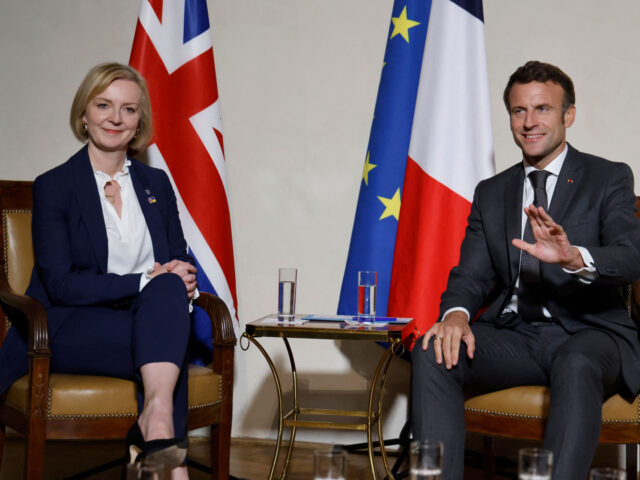Prime Minister Liz Truss agreed to sign up to another European institution as well as major wind power project at the inaugural meeting of Emmanuel Macron’s European Political Community in Prague as she attempts to shore up energy supplies to prevent possible blackouts in Britain.
In an apparent attempt to curry favour with European leaders ahead of potential energy shortages in the winter, Liz Truss has agreed to grant access to the North Sea for European offshore wind projects as she met with her counterparts in Czechia on Thursday.
The prime minister, who attempted to downplay questions of a Brexit backtrack by joining onto the new pan-European institution, also made moves to rejoin the North Sea Energy Co-operation (NSEC), another European institution technically outside of the EU which the UK left the institution in 2020 following Brexit. The members of the offshore wind group include the EU nations of Belgium, Denmark, France, Germany, Ireland, Luxembourg, the Netherlands, Norway, Sweden as well as the European Commission itself.
Truss said that the decision was “not about moving closer to Europe” but “working with Europe on issues that we both face,” The Times reported.
In addition to paving the way for European to begin constructing new offshore wind farms in the North Sea, the UK also came to a bilateral agreement with France to begin constructing nuclear power plants, with a first post-Brexit summit between the two nations on the issue of energy and migration to be held next year.
“We’re working with our partners so we’re never in the same position again of being dependent on Russia, and Russia using energy as leverage against free democracies,” Truss said.
French President Emmanuel Macron said that he hoped that Britain joining the NSEC would mark a “new phase of our common relations”.
“Having the UK being engaged in a lot of common initiatives makes sense, because we share the same continent. We have a lot of challenges in common,” Mr Macron said. “Our willingness is clearly to work together for the unity of our continent.”
The deal was struck at the first meeting of the European Political Community, a new globalist European institution dreamt up by Macron in May, in a bid to expand the influence of EU countries, including France, over non-EU countries including Ukraine, which faces years of bureaucratic hurdles before being able to join the bloc as a full member.
While the new institution appears to be an open power grab by Macron and the Brussels establishment and according to some is reminiscent to the early days of the European Economic Community (EEC), an institution the UK joined in 1973 and which eventually reformed into the European Union.
The fact that Liz Truss has been so keen on the idea, going so far as to even offer to host the second meeting of the group of 44 nations in London — an offer that was turned down — has raised concerns among the Eurosceptic community in Britain, including Brexit leader Nigel Farage, particularly in light of the fact that Truss campaigned against the UK leaving the EU in the 2016 referendum.
The UK is not in a particularly strong position, however, with decades of refusal by successive governments to exploit the nation’s natural resources to become energy independent in favour of green agenda ideology projects, coupled with the global supply shocks following coronavirus lockdowns and the war in Ukraine, the UK is facing the prospect of blackouts this winter.
The National Grid warned this week that there is a risk for both businesses and households experiencing blackouts of up to three hours per day during the winter, and said that energy rationing measures may be necessary in order to prevent more widespread outages. While both the Netherlands and Belgium committed to keep the flows of energy and gas coming to Britain throughout the winter months, it remains to be seen what position Europe will be in to provide the UK with gas given the potential of more restrictions of Russian energy.
While Truss has said that the UK has good energy supplies heading into the winter, she refused to rule out the possibility of blackouts.
The overture toward seeking “common ground” with Europe by Truss has been met with glee by the pro-EU establishment on both sides of the English Channel, with globalist Dutch Prime Minister Mark Rutte heaping praise on the UK leader, saying that he was “really impressed” in the “fantastic” meeting with Truss.
Follow Kurt Zindulka on Twitter here @KurtZindulka

COMMENTS
Please let us know if you're having issues with commenting.